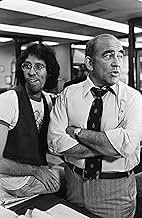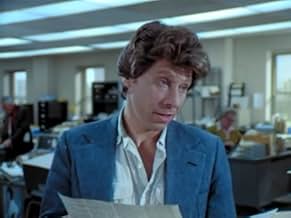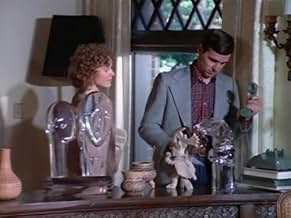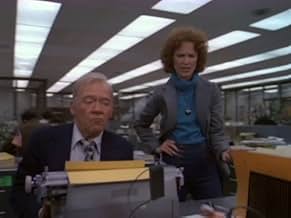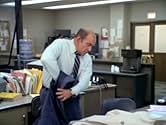CALIFICACIÓN DE IMDb
7.3/10
2.6 k
TU CALIFICACIÓN
Los problemas de un ex-manager televisión, convertido en editor de la ciudad del periódico, y su personal de periodismo.Los problemas de un ex-manager televisión, convertido en editor de la ciudad del periódico, y su personal de periodismo.Los problemas de un ex-manager televisión, convertido en editor de la ciudad del periódico, y su personal de periodismo.
- Ganó 13 premios Primetime Emmy
- 28 premios ganados y 73 nominaciones en total
Explorar episodios
Opiniones destacadas
Judged by 1977-82 standards, this show was peerless.
Today, it's a bit "dated" in certain ways. But these elements actually make it a valuable portrait of its era.
Talented cast, right down the line. Terrific writing. Skillful, sensitive directing. Highly relevant. Courageous. And one of TV's all-time-best role models in the lead.
Every Emmy -- & there were MANY -- was fully deserved. Also the Peabody, the Humanitas, & all the other awards it won.
Each season was as strong as or stronger than its predecessor; this is one show that was NOT running out of steam.
In fact, during the Reagan Years, we needed it more than ever! (Would have loved to see its take on Iran-Contra.)
Shame on CBS for bowing to pressure because of Asner's politics and the show's oft-controversial scripts.
LOU still shines.
Waiting impatiently for (legal) DVD release!
Today, it's a bit "dated" in certain ways. But these elements actually make it a valuable portrait of its era.
Talented cast, right down the line. Terrific writing. Skillful, sensitive directing. Highly relevant. Courageous. And one of TV's all-time-best role models in the lead.
Every Emmy -- & there were MANY -- was fully deserved. Also the Peabody, the Humanitas, & all the other awards it won.
Each season was as strong as or stronger than its predecessor; this is one show that was NOT running out of steam.
In fact, during the Reagan Years, we needed it more than ever! (Would have loved to see its take on Iran-Contra.)
Shame on CBS for bowing to pressure because of Asner's politics and the show's oft-controversial scripts.
LOU still shines.
Waiting impatiently for (legal) DVD release!
In the final episode of "The Mary Tyler Moore Show"(CBS-TV:1970-1977),when everyone but idiotic anchorman Ted Baxter was fired from station WJM-TV in Minneapolis in 1977,Mary Richards and her fellow casualties were left reeling. It was a bittersweet finale for the beloved series after seven seasons. Then Mary's old crusty boss,station news director Lou Grant,made a smooth transition. Within weeks,he had blown Minneapolis and snagged a good job in Los Angeles as the city editor of The Tribune. That's right:Lou Grant went from the glamour and glitz of TV news(such as it was at bumbling WJM) to embrace print journalism. At The Tribune,the formerly comic Lou(still played by Edward Asner)got serious about news. What resulted was "Lou Grant," a superlative drama series that became one of the greatest dramatic shows ever to embrace the mid-1970's. This was a grand series that arrived in the blazing afterglow of Watergate coverage and the rehealing from the aftermath of the Vietnam War. The bracing message of that era: Two dogged reporters(and a newspaper that backed them up)could change the world-and earn the public's adoration.
Anti-press fulminations from the Nixon administration were largely nullified by scandals and disgrace in the White House. It was only later that an anti-media crusade took hold,drawing the battle lines between the press and the government,and breeding suspicion among much of the citizenry. It was later,as well,that newspapers were obliged to adapt to emerging,unimagined challenges:new media platforms,"citizen journalists",and information-dispersing gadgets with global reach that anyone could buy. The Trib reporters were spared these distractions and identity crises. For them,news still took the form of ink on paper,preferably with comics,crosswords puzzles,and horoscopes were part of the deal. The zeitgeist of "Lou Grant" was set forth in the clever opening sequence and this show celebrated it. Sure it may seem primitive that,in its first season,Trib reports were getting information and their sources with pencil and paper and banging out their stories on the typewriters. But "Lou Grant" was breaking ground from its debut on September 20,1977 producing 114 episodes for CBS-TV until the series finale on September 13,1982. Produced under Mary Tyler Moore's production company,MTM Productions.
Reconfiguring a half-hour sitcom into a hour long drama was risky. The show dared to populate "Lou Grant" with a full-out ensemble cast which not only included Ed Asner,but also Robert Walden who played driven young investigate reporter Joe Rossi;Mason Adams as Managing Editor Charlie Hume;Linda Kelsey as reporter Billie Newman determined to make good in what was at the time a male-domination profession along with another ambitious young girl reporter Carla Mardigian portrayed by Rebecca Balding(who lasted one season). Also on board was the glorious Nancy Marchand(later,of course Tony's craven mother on "The Sopranos")was Mrs. Pynchon,who was the genteel owner of the Trib. Taking full advantage of its news-oriented setting,this was a brilliant series that dealt with issues ranging from nuclear accidents to religious freedom,media ethics and civil and social rights. This was a big-hearted series that won 13 Emmys,two Humanita Prizes and a Peabody award among many honors. This was drama-comedy hybrid that emerged from the series creators:James L. Brooks and Allan Burns(the writers-producers from "Mary Tyler Moore"),along with Gene Reynolds(who was not only the principal behind the TV incarnation of "M*A*S*H",but also was the producer of such shows as "Room 222"). This was a series that broke ground in the way television dramas are depicted and to this day it still holds the title some 30 years later.
Anti-press fulminations from the Nixon administration were largely nullified by scandals and disgrace in the White House. It was only later that an anti-media crusade took hold,drawing the battle lines between the press and the government,and breeding suspicion among much of the citizenry. It was later,as well,that newspapers were obliged to adapt to emerging,unimagined challenges:new media platforms,"citizen journalists",and information-dispersing gadgets with global reach that anyone could buy. The Trib reporters were spared these distractions and identity crises. For them,news still took the form of ink on paper,preferably with comics,crosswords puzzles,and horoscopes were part of the deal. The zeitgeist of "Lou Grant" was set forth in the clever opening sequence and this show celebrated it. Sure it may seem primitive that,in its first season,Trib reports were getting information and their sources with pencil and paper and banging out their stories on the typewriters. But "Lou Grant" was breaking ground from its debut on September 20,1977 producing 114 episodes for CBS-TV until the series finale on September 13,1982. Produced under Mary Tyler Moore's production company,MTM Productions.
Reconfiguring a half-hour sitcom into a hour long drama was risky. The show dared to populate "Lou Grant" with a full-out ensemble cast which not only included Ed Asner,but also Robert Walden who played driven young investigate reporter Joe Rossi;Mason Adams as Managing Editor Charlie Hume;Linda Kelsey as reporter Billie Newman determined to make good in what was at the time a male-domination profession along with another ambitious young girl reporter Carla Mardigian portrayed by Rebecca Balding(who lasted one season). Also on board was the glorious Nancy Marchand(later,of course Tony's craven mother on "The Sopranos")was Mrs. Pynchon,who was the genteel owner of the Trib. Taking full advantage of its news-oriented setting,this was a brilliant series that dealt with issues ranging from nuclear accidents to religious freedom,media ethics and civil and social rights. This was a big-hearted series that won 13 Emmys,two Humanita Prizes and a Peabody award among many honors. This was drama-comedy hybrid that emerged from the series creators:James L. Brooks and Allan Burns(the writers-producers from "Mary Tyler Moore"),along with Gene Reynolds(who was not only the principal behind the TV incarnation of "M*A*S*H",but also was the producer of such shows as "Room 222"). This was a series that broke ground in the way television dramas are depicted and to this day it still holds the title some 30 years later.
In the UK this series was not networked, but in the regions of the country it was shown it collected a devoted following. Ed Asner played his roll with gusto, but with help from the excellent cast, the show began to resemble more of a documentary than a drama, as it bravely tackled contemporary social issues and concerns. American import shows had never been like this, living a fantasy world of copsnrobbers, witches and talking horses, but this was perhaps the start of a new wave? which would include shows like 'Quincy' and 'Soap'. It was apparent when this was being run in the UK that the American far right did not like the show one bit! regarding it as wet liberalism . However in countries where it was shown, it possibly showed a compassionate side of America in which it did have concerns for the ' loosers ' as well as the winners in life. Theme tune must be a classic also? Don't think it could be made in the USA today?
When I first heard about this show twenty six years ago (God, time flies), I thought this would be an extension of the show it spun off from, "The Mary Tyler Moore Show". What a surprise it was when this show turned out to be probably the greatest newspaper dramas in television history. The show wasn't afraid to take on controversial issues and even though it was a drama, it still had its lighter moments. Also, even though Ed Asner was the lead, it was more of an ensemble and the whole cast was great. This was an exceptional show and it is a lost classic.
Great iconic actors, writing of the highest caliber. Just good TV!
¿Sabías que…?
- TriviaMrs. Pynchon, the widowed owner of the fictional Los Angeles Tribune, was based on Katherine Graham, the real widowed owner of the Washington Post, and on Dorothy "Dolly" Schiff, owner and publisher of the New York Post. Schiff, for example, always carried her small dog with her, like Mrs. Pynchon.
- Citas
Billie Newman: I hate it when people tell me to calm down!
- ConexionesFeatured in The 30th Annual Primetime Emmy Awards (1978)
Selecciones populares
Inicia sesión para calificar y agrega a la lista de videos para obtener recomendaciones personalizadas
- How many seasons does Lou Grant have?Con tecnología de Alexa
Detalles
- Fecha de lanzamiento
- País de origen
- Idioma
- También se conoce como
- Gazeteciler
- Locaciones de filmación
- The Title Guarantee & Trust Building, 411 West 5th Street, Los Ángeles, California, Estados Unidos(Los Angeles Tribune Building)
- Productora
- Ver más créditos de la compañía en IMDbPro
Contribuir a esta página
Sugiere una edición o agrega el contenido que falta

Principales brechas de datos
What is the Japanese language plot outline for Lou Grant (1977)?
Responda

